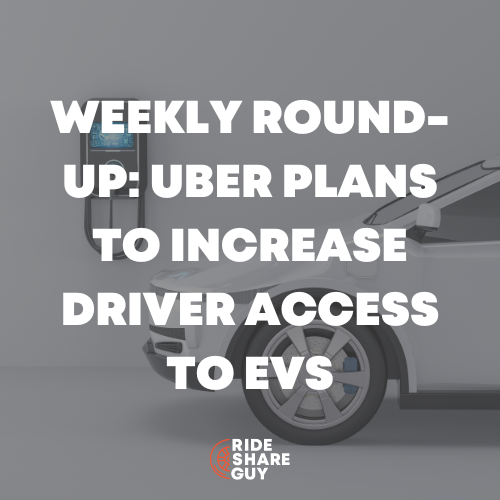In this week’s roundup, senior RSG contributor John Ince highlights articles claiming the ‘free-wheeling era of growth’ is over for Uber and Lyft, due to new regulations, laws, and general unprofitability of both companies. Do you agree with this or not? What do you think a ‘new era’ for Uber and Lyft would look like? Let us know in the comments!

Uber, Lyft Drivers Could Form Unions Under New York Proposal [Bloomberg Law]
Sum and Substance: New York lawmakers are planning to introduce a bill that would go beyond making Uber Technologies Inc. and Lyft Inc. drivers employees by also allowing them to unionize, a move that could clash with federal labor and antitrust laws.
“There’s no scenario I can imagine that’s not going to include collective bargaining,” said Sen. Diane Savino (D), adding that she and Assemblyman Marcos Crespo (D) plan to introduce the legislation after lawmakers return to Albany in January. …
The new legislation could involve some version of the “ABC” test that states like California, New Jersey, and Massachusetts use to distinguish between contractors and employees. Those tests make it harder to classify workers as contractors than the standards used in other states and under federal law.
“We will probably move in a different direction from the dependent worker classification that we had drafted,” Crespo said. “We’re trying to see if there’s a way to come up with a more workable ABC model that would sort of meet our state standards and the fact that we do have, in labor law here, collective bargaining.” …
Still, he said, “A lot of people still want to be independent contractors.”
My Take: This really is the issue here. Whether independent contractors or employees, the question is – do they speak with a voice that can be heard within Uber’s headquarters?
Uber’s London Rivals Are Plotting Its Downfall [Wired]
Sum and Substance: Irresistible deals for drivers and passengers are creating a frenetic race as fellow ride-hailing services try to cash in on uncertainty.
The ride-hailing service launched in London in June 2012, and quickly took over. It wasn’t the first such product in the capital—Hailo’s app for black cab drivers predated Uber—but it quickly became dominant, particularly with the launch of UberX, the cheaper rides that moved the app on from its original focus on luxury. At one point in 2016, 30,000 Londoners a day were installing the app on their phones, eschewing iconic black cabs in favor of a Toyota Prius summoned with a tap.
But now, Uber’s stranglehold on the city is loosening. On Monday, Transport for London, or TfL, announced its decision not to renew the company’s operating license in the city, after granting it a short extension which expired this week. Uber will appeal, meaning it can continue to operate for now, but its future in London is far from certain. And what’s bad for Uber will likely be good for pretenders to its throne…
The question for drivers, riders, and TfL is whether these new entrants have a business model that is any more sustainable, or if they’re essentially the same thing with a new logo. Bolt in particular take great pride in claiming to be more efficient than Uber in terms of capital expenditure—saving money by not splashing millions on autonomous vehicles or drones, and passing those savings on to passengers. But the company is still subsidizing rides in London for the time being. …
My Take: This is a good summary of Uber’s rivals across the pond, but how they’re doing financially is the big question. Not a lot of light on that subject, but the article is still a good read.
Is Uber Really Unprofitable? It’s Complicated. [Mother Jones]
Sum and Substance: Former California controller Steve Westly writes in the LA Times today that he doesn’t favor making gig workers either pure contractors or pure employees. He favors a middle ground called “dependent workers” that’s used in Canada and Spain.
There might be something to this—I’m agnostic about it for now—but I want to point to one specific part of his argument:
It’s important to remember that Uber and many other gig economy companies are not profitable. Uber is currently losing over $1 billion a quarter and is likely to have an extremely difficult time raising future rounds of capital. This is especially true if it is forced to pay higher wages and benefits — and profitability is no longer in sight. If Uber or any of these companies goes out of business, everyone loses. A negotiated compromise could obtain higher wages for workers without putting companies on the hook for full benefits for all…
So why is the company as a whole so massively unprofitable? Because Uber has chosen to plow its profits (and more) into new areas that require enormous spending on both R&D charged to the corporation as well as other corporate expenses…
My Take: I don’t pretend to know the ins and outs of Uber’s profitability. It’s a complicated situation, but I do know that Amazon was investing in infrastructure and Uber is investing in marketing. The two are different – for whatever it’s worth.
Uber’s free-wheeling era of growth is coming to an end [Quartz]
Sum and Substance: November was a bad month for Uber. London declined to renew its license. Seattle approved new fees on rides and a to-be-determined minimum wage for drivers. Chicago passed a congestion tax on ride-hail services that adds as much as $3 to private rides during peak hours. New Jersey hit the company with a $640 million bill for misclassifying drivers as independent contractors….
Ride-hail companies have entered a new era, marked not by breakneck growth but by skeptical and emboldened regulators. Cities lost the first round against Uber, which strong-armed them into passing rules it wrote to suit its ride-hail service before anyone could figure out what was happening. Now, cities have regrouped and are flexing their muscles. One by one, Uber’s most important markets—London, New York, Los Angeles, San Francisco, the entire state of California—are proposing taxes and rules that one way or another make rides more expensive.
My Take: This is an incisive analysis of the big question mark hovering over this space – regulatory oversight. Seems to me that the rules of the game are changing – and they’re not changing to Uber’s (and Lyft’s) liking.
Readers, what do you think of this week’s roundup?
-John @ RSG




